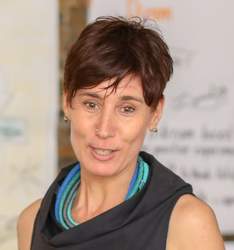Didactic Wednesday starts!

This blog series is about the optimal interaction of teaching and learning – topics that concern every trainer, course coach, education secretary, lecturer and pedagogical staff.
The #dimi is specifically about questions you ask yourself when planning a new seminar, for example:
• What are the aims of the seminar?
• What is the best way to set it up?
• What do the participants need to learn well?
#dimi also addresses thoughts that may be going through your mind when you go home frustrated after a seminar day and ask yourself why some things just didn’t work out the way you had imagined „on the greenfield“ of your training planning.
What is it about?
The #dimi blog series is meant to provide answers to these questions, but also to generate further or new questions. Learning and teaching – training, lecturing and working with groups is an activity that cannot be conducted according to a stubborn recipe book and that thrives on the willingness to ask and question. Nevertheless, there are numerous pedagogical tools and concepts that support us in not leaving learning success to chance. In the #dimi you will have the opportunity to learn more about this and to get to know practical examples that show why comprehensive planning can provide security and flexibility in implementation and which basic considerations can give us orientation in the process.
Structure of the blog series
The structure of the #dimi series follows the logic of a train-the-trainer programme. Ideally, you should follow it from start to finish. If you are a new trainer, you can use the blog series as a step-by-step guide for your own planning process. You can think of a specific training project and develop it with the help of #dimi.
Each post can also be read individually. If you have been in the business for a long time, the examples from (trade union) practice might help you to get new ideas for practical implementation. You will also find questions that make you think (e.g. about your role). Are you just curious about everything related to learning? Then you will be provided with helpful links at the end.
A warm hello from me, the blog author
My name is Margret Steixner. I call myself a trainer, coach or adult educator. My studies in comparative education, my qualification as a nursery school teacher, a coaching and group dynamics training form the basis of my knowledge, along with other further training. In the years as an independent trainer, I have enriched this knowledge with practical experience in various fields.
When it comes to describing what I really do, it is easier to name the topics that interest me most in my professional work and make up my passion for my profession.
My passion is the subject of LEARNING. I try to find out what makes adults interested in a subject and go to an educational institution night after night to study with others, like in the trade union school.
I am also interested in what trainers do to make learning processes entertaining and how they convey knowledge in such a way that the learners carry it out into everyday life and use it there. In addition, I am always interested in the influence of group interaction on learning and how learners are encouraged to take responsibility for their own learning. In a nutshell, for me training means:
- Working with people.
Every learner comes to the seminar (or webinar) room as a human being and helps to shape the individual, but also the joint learning process. I see one of the most exciting tasks as a trainer as discovering the diversity of these (pre-)experiences and making room for them. How do I draw this knowledge out of the participants and find out what practical experiences they have had and how the new knowledge can be integrated into the existing wealth of experience? - Putting the learners in the centre.
Who has not experienced this? An impressive lecture – a speaker who can talk freely and impresses the audience with his or her eloquence. But at the end you think to yourself: „Wow, she’s got something. I’ll never get there.“ You’re left with admiration, and maybe a few exciting thoughts. For me, training is more than passing on my knowledge. If I, as a trainer, manage to get the learners to open their own treasure chests, exchange experiences and link the new knowledge to them, then the interaction that we call practical transfer is created. This only works if I don’t set myself up as THE expert and wallow in the sun of competence. For me, being a trainer means consciously stepping back again and again and putting the learners at the centre. (Rolf Arnold calls this: Ways out of pedagogical narcissism. I will talk about his „enabling didactics“ in #dimi_02). - Passing on knowledge. I enjoy this part of the work because it gives me the opportunity to deal intensively with certain topics and to get to the bottom of them. (According to Benjamin Bloom, it is only by passing on knowledge that we reach the highest level of competence in his taxonomy. I explain this model in #dimi_06).
In this spirit, I would like to invite you with #dimi:
• to think about it („ah yes, I haven’t thought about that yet“)
• to try it out („good idea, I could do that differently“)
• to discuss („do you really think that could work?“)
With this blog series I would like to give you some impulses on how to increase the quality of your (trade union) educational events.
Curious now? Well, then: see you at the next #dimi.
Author: Margret Steixner
Lust auf mehr? Zu allen Beiträgen der Serie kommst du HIER!

Dieses Werk ist lizenziert unter einer Creative Commons Namensnennung-NichtKommerziell-Weitergabe unter gleichen Bedingungen unter gleichen Bedingungen 3.0 Österreich Lizenz.
Volltext der Lizenz

Dieses Werk ist lizenziert unter einer Creative Commons Namensnennung-NichtKommerziell-Weitergabe unter gleichen Bedingungen unter gleichen Bedingungen 3.0 Österreich Lizenz.
Volltext der Lizenz


